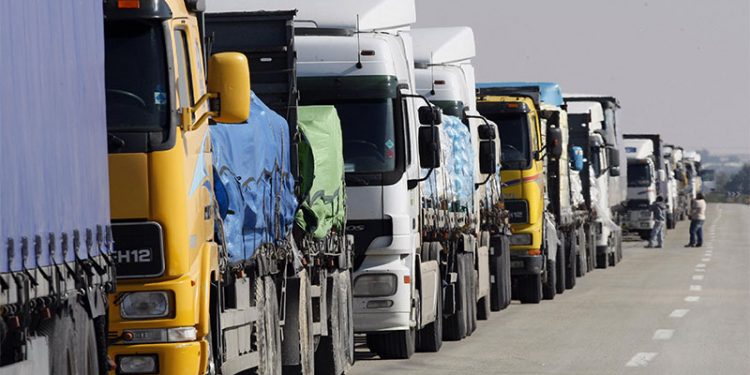An Inter-ministerial meeting held in Uganda yesterday reached a middle ground consensus on testing the Covid 19 at borders crossing after a three days protest by truck drivers at Malaba and a long queue stretching for over 50 kilometers.
The meeting agreed that in order to clear the backlog of cargo accumulated at the border points, due to the testing impasse, as an interim measure, the Uganda government will clear all truck drivers and their accompanying staff with negative Covid 19 PCR certificates taken in the last 72 hours.
Dr. Henry Mwebesa, Director General in Charge of Health Service, however, issued a list of 66 laboratories spread in the region that must carry out the test. Four labs will be stationed in Burundi, 20 in Kenya, five in South Sudan, Rwanda 10 with Uganda and Tanzania having 22 and five labs respectively. Out of the total labs, 34 are public and 32 are private facilities.
The regional assessment team was composed of experts from partner states with each country member drawing 2 lab experts, World Health Organization lab experts from each partner state, and Ministry of Health officials.
Uganda authorities, on 20th December last year, directed testing of all incoming travelers, including truck drivers. The directive proposed the review of the Regional Electronic Cargo and Drivers Tracking System (RECDTS), which allows Covid 19 testing after 14 days, to a shorter duration of 7 days due to the high transmissibility of the Omicron variant, which has a shorter incubation period.
In a recent statement, Kenya Transporters Association (KTA) threatened to pass the extra testing costs of US$ 300 charged per test to the cargo owners as an additional cost. KTA also wanted clarification of how frequently the test will be carried out and their duration. In the other EAC, Covid 19 tests are carried out free of charge.
“We need assurance on the safety and the security of drivers and trucks in case the result turns out positive. Where will the drivers be isolated and at what costs? who will pay the cost? What will be the duration of isolation period if the driver is asymptomatic,” Newton Wang’oo, KTA chairman wrote in a statement copied to the ministers of Health In Kenya, Uganda, and Rwanda.
Since 2020, the region has been operating a Regional Electronic Cargo and Drivers Tracking System (RECDTS), an initiative that was supported by Trademark East Africa (TMEA), to monitor Covid 19 cases across the borders. Ministries of health in EAC share Covid 19 results from various tests centers and the results are acceptable across the borders, easing crossing time.
Although Ugandan authorities gave assurances that the changes will not cause traffic jams at the borders, industry players were of the contrary opinion. Because of the logistical limitations in setting up the system, the lack of awareness among the targeted travelers including truck drivers, the lack of sufficient holding bays for the big cargo trucks among others, the Federation of East African Freight Forwarders Associations (FEAFFA) president Mr. Fred Seka warned of a potential cargo pile-up.
The region has been setting up systems to ensure no more testing is done at the borders to avoid traffic snail-ups. The new measure is introducing a direct additional cost to the private sector which is likely to hurt the end consumers of the cargo being traded across our borders, Seka said.
He also urged all EAC Partner States to provide free covid19 testing for truck drivers as essential service providers. This will boost the functioning and benefits from the RECDTS.
“For fully vaccinated and recently tested truck drivers, health authorities in the EAC should consider less stringent and cost-friendly alternatives such as rapid tests. This will reduce the number of tests truck drivers are subjected to given the significantly high frequency with which truck drivers cross borders,” Seka said.
For frequent and essential cross-border travelers such as truck drivers, provisions should be made for their tests in one country to continue being recognized and accepted across borders as provided in the RECTDS.
The region should also fast-track the adoption of the EAC Covid19 vaccine passport. This will promote uptake of the covid19 vaccine among truck drivers and other logistics sector workers.
“As a normal practice, all stakeholders in the regional transport and logistics industry should be adequately mobilized and sensitized on this new approach before it is implemented. The consequences of a sudden shift in approach are likely to more harmful as we are starting to witness,” Seka said.





